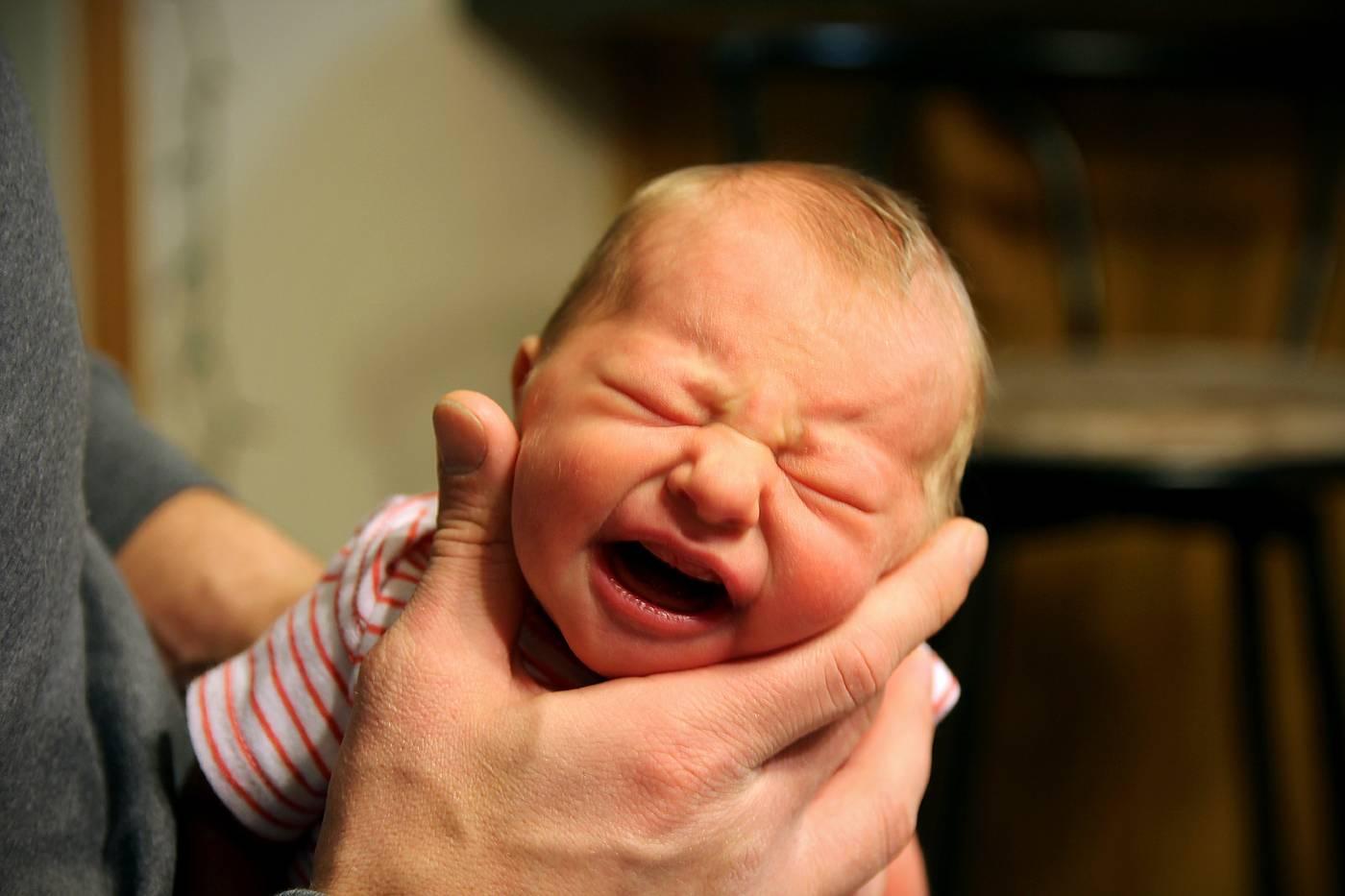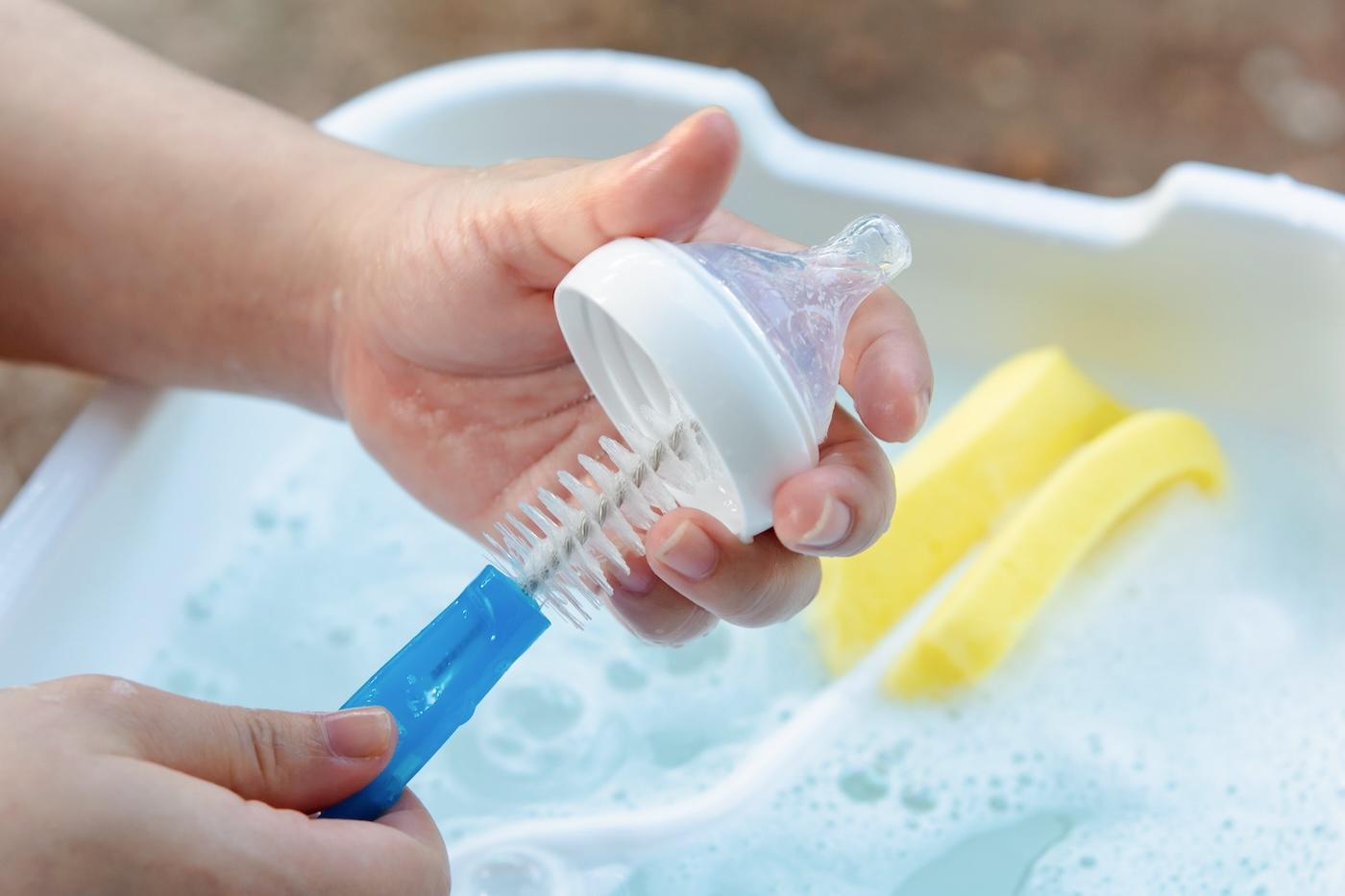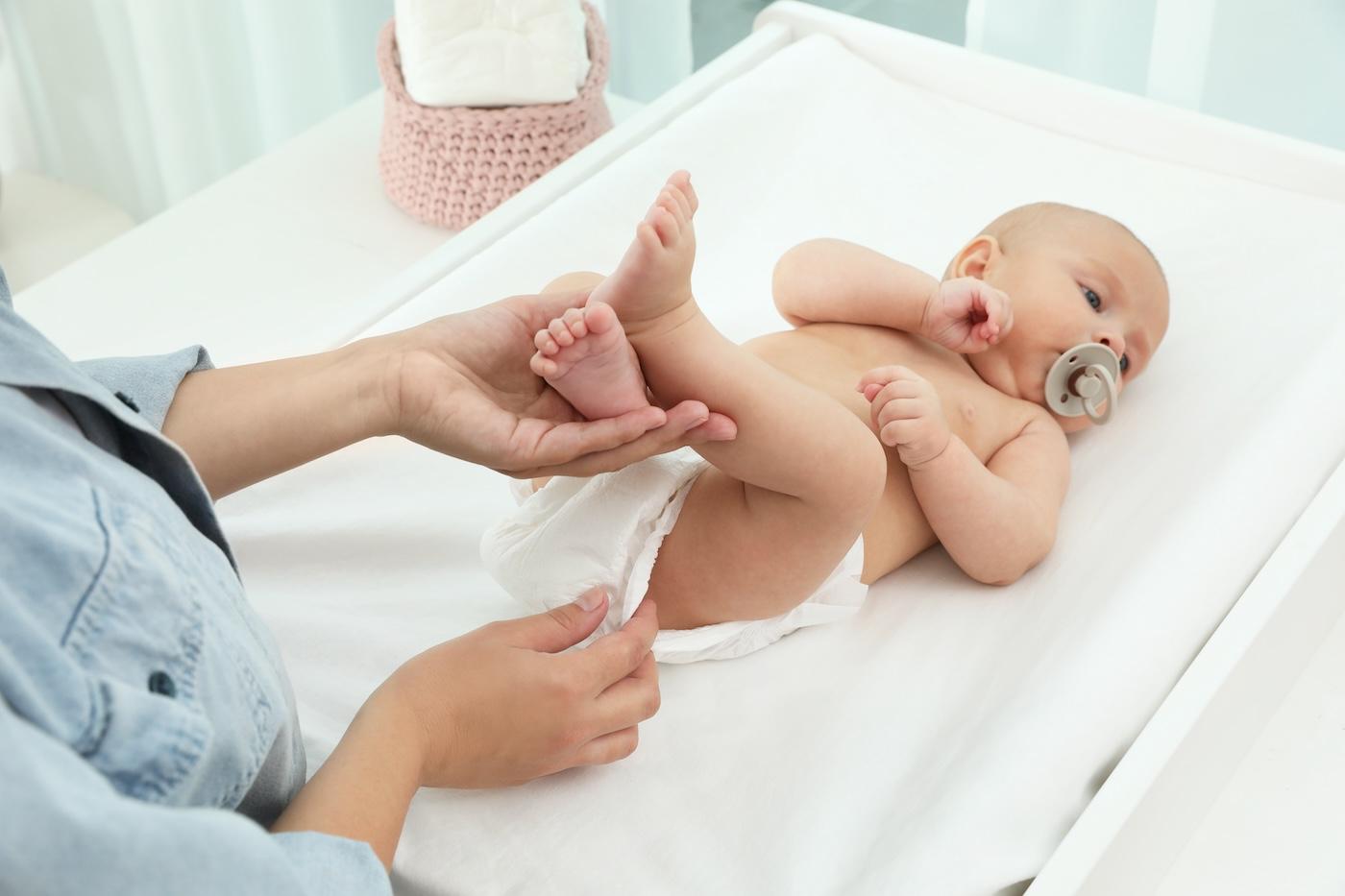BABY
Science-Backed Tips to Help a Gassy Baby
Are all those toots and burps a sign that something is wrong? Find out what’s normal—and how to prevent and relieve infant gas.

Written by
Holly Pevzner

Move over coos and giggles! Thunderous farts and the gut-rattling burps are more likely the tune your baby will be playing during their first few months. After all, babies are notoriously gassy creatures! While all those toots and belches are usually par for the course, at times, baby gas can be worrisome. If you’re wondering why your baby has so much gas—and how to relieve their discomfort—here’s what you need to know about helping your gassy baby feel better.
Why does my baby have so much gas?
It’s not just your little one! All babies are gassy in their first few months of life—at least! For one, your newborn is just beginning to learn how to breathe air, which means they’re bound to accidentally swallow some when they cry, eat, or suck on their binkie. And all of that excess air transforms into burps. Toots, on the other hand, often occur when (perfectly normal) bacteria “eats” the undigested breastmilk or infant formula that sits idle in your baby’s gut. Baby farts are a byproduct of this.
But despite this seemingly virtuosic gas-fueled symphony of sounds, babies actually aren’t very skilled at passing gas. They’re still getting used to the sensations and what to do about it. Moreover, infants often don’t yet know how to coordinate their anal musculature, which means they may think they’re pushing a toot out, but they’re actually clenching their little bodies and holding it in! The good news? While the discomfort associated with gas typically peaks between 6 and 8 weeks, the American Academy of Pediatrics (AAP) notes that the situation drastically improves by 3 months.
Gassy Baby Signs and Symptoms
Of course you can hear your baby toot and burp, but there are more signs that your little one might be struggling to pass gas. Other signs your baby is gassy include…
- Reddened and/or scrunched face
- Legs pulled up to belly
- Clenched fists
- Post-feed discomfort
- Extra cranky
- Extra squirmy
What is the most common cause of gas in infants?
More often than not, swallowing too much air while nursing or bottle-feeding causes gas in babies. Here are some of the reasons your little one might be swallowing too much air:
- Crying
- Sucking a paci
- Drinking too fast
- Drinking while inclined
- Drinking from a too-big bottle nipple holes
How can I prevent my baby from getting gas?
While there’s no surefire way to keep your baby 100% gas-free, there are strategies you can take that’ll help prevent your baby’s gas and discomfort:
- Stick to breastmilk and formula. Don’t give your baby any cow’s milk or juice before they’re at least 12 months old. Not only are these bevs big nutritional no-nos for infants, but babies’ wee bodies are not designed to break down the protein in cow’s milk protein or the fructose and sucrose in juice, which leads to tummy trouble, like gas. (Learn when it’s okay to give juice.)
- Let infant formula settle. The mixing and shaking involved with making powdered formula cause gas-producing bubbles. To avoid this, allow the formula to settle for a few minutes before serving—or use a concentrated or ready-to-feed infant formula.
- Use special bottles. Use vented, angled, or collapsible bottles that are designed to help keep babies from swallowing extra air while eating. (Learn more about making and storing infant formula.)
- Try slow-flow nipples. Use a nipple that creates a slower flow, which will help your little one swallow less air—and produce less gas.
- Feed your baby before they’re upset. When babies are famished, they tend to gulp quickly, which means they swallow a lot of air—and that’s on top of the air they swallow when crying!
- Tilt the bottle. Make sure you tilt the bottle during feedings so that the entire nipple is filled with milk, which’ll help keep the air bubbles out.
- Feed your baby partially upright. Allowing gravity to do its thing helps with digestion, which prevents gas from getting trapped. (Should you try paced bottle feeding?)
- Check Baby’s latch. Whether drinking from a bottle or the breast, your baby needs a good latch to keep the gas-producing air out of their tummy. When nursing, your baby’s lips should create a seal around the areola. When bottle-feeding, their lips should do the same around the base of the bottle nipple.
- Burp like this. Instead of interrupting a nursing session to burp your baby, experts recommend holding your little one upright before switching breasts to give them a chance to burp. If you’re bottle-feeding, hold your bub upright for a few minutes after they’re all done to allow the burps to come out.
How to Get Rid of Baby Gas
Some babies handle their gas like old pros, tooting and burping without much intervention at all! But others may need a little help. If you need help relieving your baby’s gas, try these expert-approved methods:
- Offer tummy time. Roughly 20 to 30 minutes after your baby is done eating, place them on their belly for some supervised tummy time. The gentle pressure on their stomach can help move the gas through their intestines. (Get tummy time tips.)
- Bicycle their legs. To help release the gas in your baby’s tummy, lay them on their back and move their legs in gentle, circular motions, as if your bub were riding a trike.
- Bend your baby’s knees. When your baby is on their back, hold their feet in your hands and gently bend their legs, bringing their knees to their bellies.
- Give a tummy rub. Starting on your bub’s right lower stomach, in a clockwise motion, gently massage your baby’s tummy. Keep your fingers flat and close together to keep the light to medium pressure constant.
- Offer a back rub. Alternatively, you can lay your little one on their tummy across your lap and massage their back after feeding to help move the trapped air.
- Burp your baby. Burping not only helps prevent uncomfortable gas from building, it can relieve the gas that’s already settled in. If your baby is gassy during a bottle-feed, try burping them after every 2 to 3 ounces. If they’re gassy while nursing, burp them every 5 minutes or when you switch breasts.
- Hold your baby upright. Hold your baby upright for about 15 to 30 minutes after a feeding to help the gas easily move through your baby’s system.
Do gas drops for babies work?
Gas drops, aka simeticone drops, works by corralling small gas bubbles in your baby’s gut to form bigger bubbles, which allows trapped air to more easily pass through their wee body. While gas drops (Mylicon, Little Tummys gas relief drops, Phazyme) are approved by the Food and Drug Administration (FDA) as a gas treatment for babies, they’re “not that effective,” according to the AAP. That said, since gas drops are a safe option, it may be worth a try, especially if your baby is extremely gassy. Experts recommend consulting with your baby’s healthcare provider about using the drops about four times a day, regularly, to help prevent gas, rather than to relieve gas.
Do probiotics help relieve baby gas?
The AAP notes that probiotics may be worth a try for relieving baby gas, but they’re not always helpful. Since there’s not a lot of data that supports using probiotics to treat infant gas, the AAP urges parents to discuss the use of probiotics with your child’s pediatrician first.
Does gripe water relieve baby gas?
Gripe water is billed as an herbal remedy to treat infant gas, but there’s no solid scientific evidence that confirms gripe water is an effective treatment for baby gas—or a safe treatment for baby gas. It’s also important to note that because gripe water is a natural infant gas remedy, the FDA does not regulate it. In the end, the AAP recommends discussing the use of gripe water for gas with your baby’s pediatrician before deciding if it’s worth a try.
Is my breastmilk making my baby gassy?
There is some research that suggests food in a breastfeeding parent’s diet could make a baby gassy, but the evidence is not conclusive. In fact, since there’s no “absolute correlation” between certain foods in a breastfeeding parent’s diet and the production of gas in a baby, experts warn against willy-nilly nixing foods while nursing. After all, you need a lot of nutrients from a variety of sources to produce enough, nutrient-dense breastmilk. With that, some nursing parents may benefit from cutting back on some gas-causing foods if they feel especially gassy themselves. But before eliminating any good-for-you foods from your diet, first examine how you’re nursing—and your breastmilk supply. That’s because the following breastfeeding-related scenarios are known to cause babies to swallow excess air, which leads to gas:
- Overabundant milk supply
- Strong let-down
- Poor latch
- Nursing with baby in a full recline
- Breastfeeding an upset infant
Which formula is best for gassy babies?
If you have a gassy baby—and they’re otherwise doing just fine—trying a different infant formula may be just what your little one needs, according to the AAP. Just be sure to discuss any infant formula changes with your pediatrician before making the switch. They may recommend using a “sensitive” infant formula that contains either less lactose or a partially hydrolyzed (broken-down) lactose for a week to see if there’s any effect on your baby’s gas. If your baby is still just as gassy after a week, your doc may suggest returning to your little one’s original baby formula and trying a different strategy. Learn more about hydrolyzed and partially hydrolyzed infant formula—and all your other options, too.
How do I know if my baby has gas or colic?
It can be tricky to tell if your baby has colic or gas, that’s because a baby with colic may be gassy, too! (Coliky babies swallow a lot of air when crying, thus they tend to burp and toot often.) But an infant who’s gassy doesn’t necessarily have colic. The rule of thumb for identifying colic in babies is: crying for more than three hours a day, at least three days a week, and consistently for longer than three weeks. And, unfortunately for their exhausted parents, colicky babies generally are not soothed by relieving their gas. (Learn how to relieve colic.)
When should I take my baby to the doctor for gas?
Before you hustle to the doctor’s office, know that while infant gas can be uncomfortable, it’s not dangerous, according to the AAP. But if your baby’s gassy every day with no sign of improvement—and their toots and burps are keeping them from doing their “happy baby things,” like sleeping and pooping, you should definitely consult your baby’s healthcare provider. Here, more reasons to take your baby to the doctor for gas:
- Your baby isn’t gaining weight.
- Often, your baby doesn’t want to eat.
- Your baby finds it difficult to feed.
- Your baby seems constipated.
- You suspect your baby has an allergy or has had an allergic reaction.
- Your baby seems unhappy most of the time.
More Newborn Need-to-Knows:
- Learn The Ultimate Newborn Soothing Trick: The 5 S’s
- Why Rocking Soothes Newborns
- Dr. Harvey Karp’s Best Newborn Sleep Tips
- Newborn Baby White Noise Benefits
***
REFERENCES
- Children’s Hospital of Philadelphia (CHOP): How to Help a Newborn with Gas
- Cleveland Clinic: Gassy Baby? Here’s What You Can Do
- American Academy of Pediatrics (AAP): Abdominal Pain in Infants: 8 Possible Reasons Your Baby’s Tummy Hurts
- RMC Health System: Why Is My Baby So Gassy?
- Kaiser Permanente: Belly (Abdominal) Gas in Babies
- AAP: Breaking Up Gas
- Penn Medicine Lancaster General Health: How to Prevent and Relieve Baby Gas
- Children’s Minnesota: Abdominal Massage
- The Nemours Foundation, KidsHealth: Burping Your Baby
- Simethicone. StatPearls. January 2024
- Cleveland Clinic: Why Gripe Water Isn’t the Best Answer for Your Fussy, Gassy or Colicky Baby
- Methodist Health System: Gassy Baby? Try This...
Disclaimer: The information on our site is NOT medical advice for any specific person or condition. It is only meant as general information. If you have any medical questions and concerns about your child or yourself, please contact your health provider.
SHARE THIS ARTICLE
MOST LOVED
Sleepytime Sidekicks
More on Baby
About Holly Pevzner
Holly Pevzner is Happiest Baby’s Staff Writer. She specializes in creating parenting, pregnancy, health, nutrition, and family travel content. Her work—including essays, columns, reported features, and more—has appeared in outlets such as EatingWell, Family Circle, Parents, Real Simple, and The Bump. Before becoming a full-time writer, Holly held senior staff positions at Prevention, Fitness, and Self magazines, covering medical health and psychology. She was also a contributing editor at Scholastic Parent & Child magazine and a regular kids-health columnist for Prevention and First For Women magazines. Holly lives in Los Angeles with her husband, two boys, and terrier mix.












